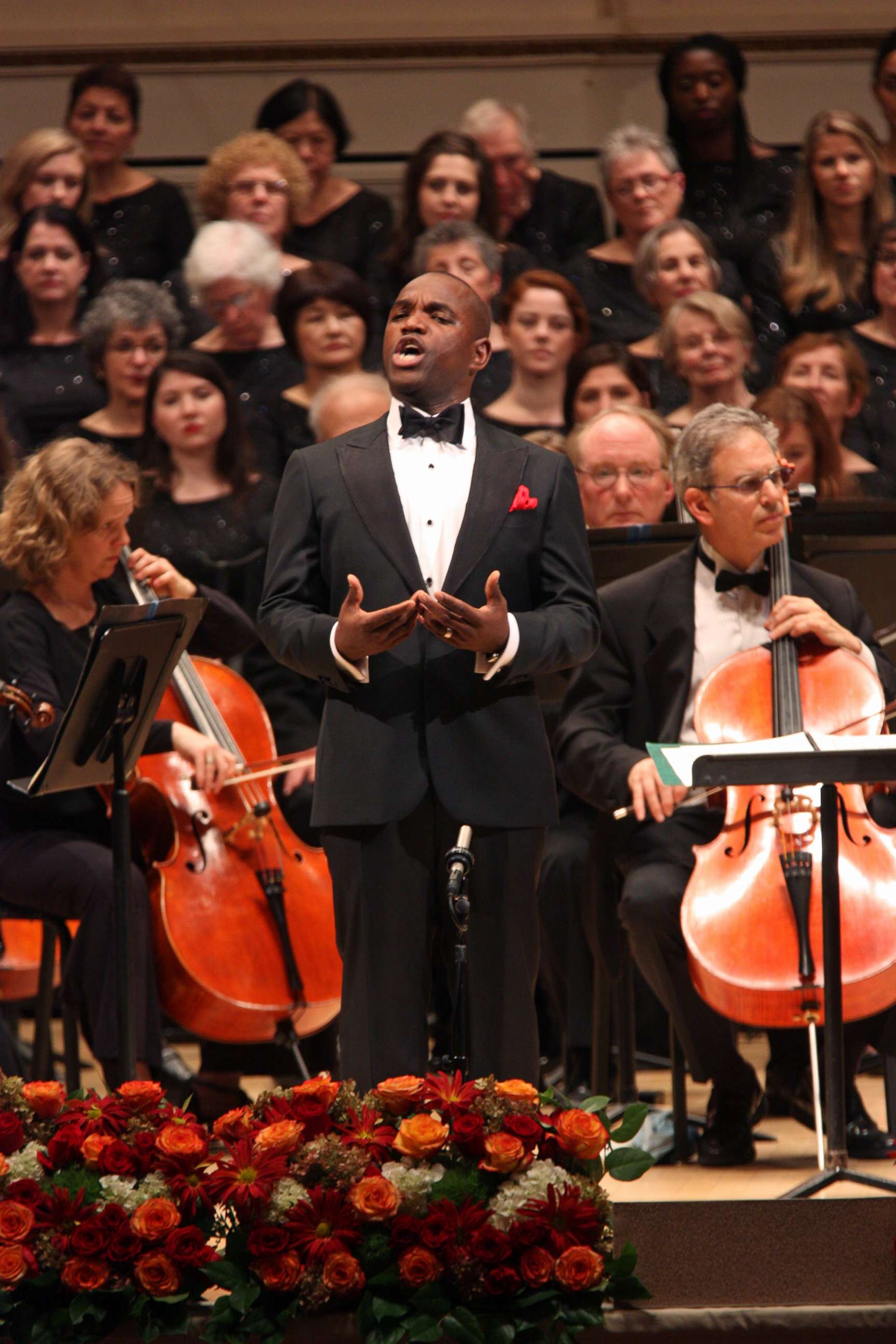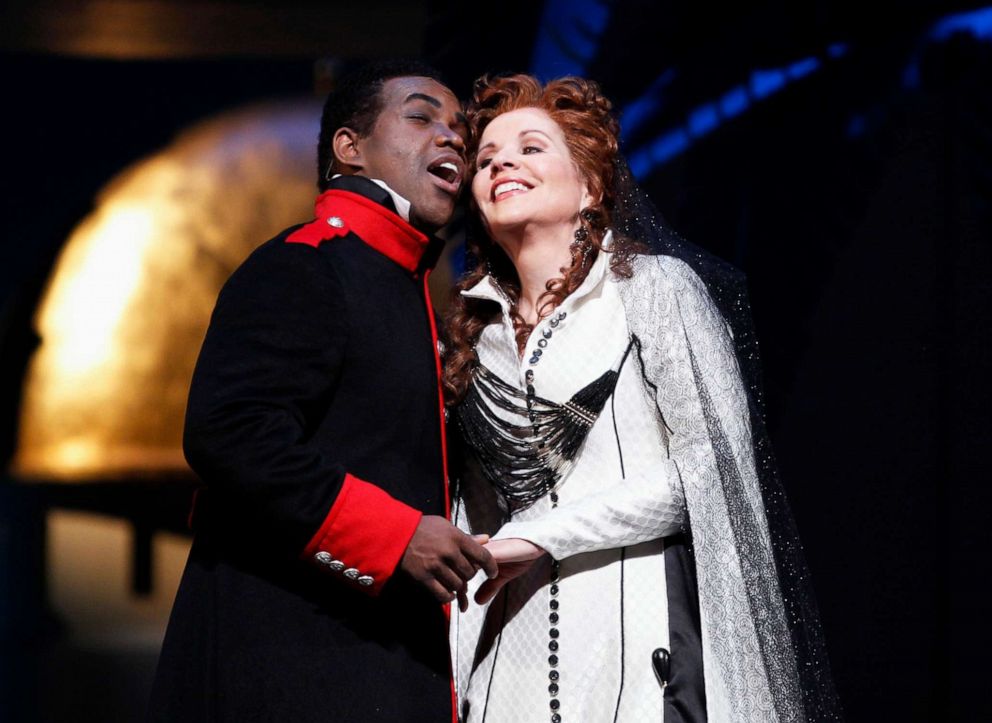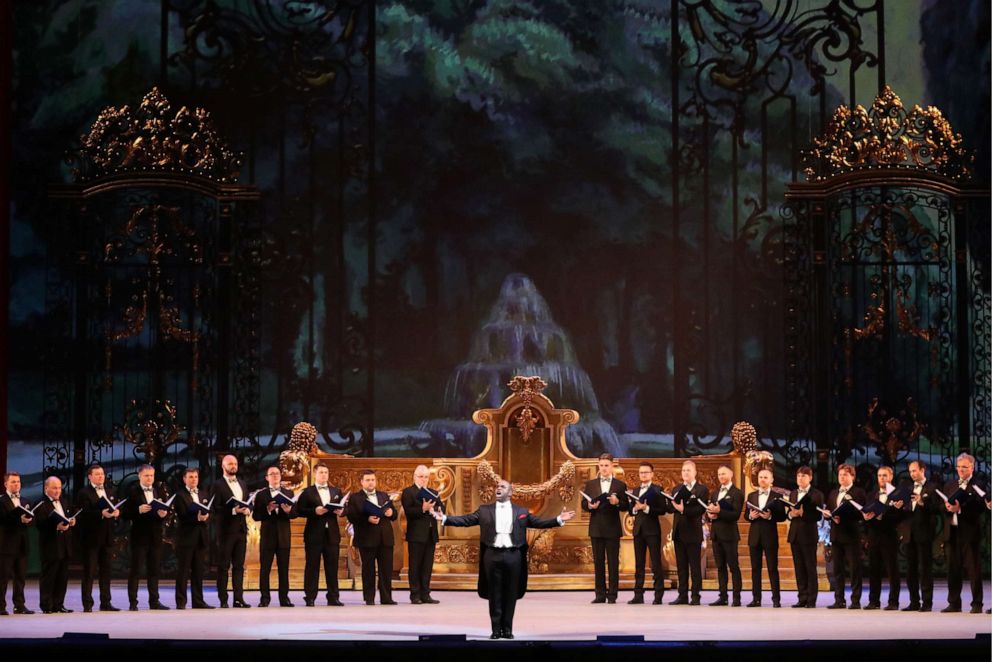Lawrence Brownlee is in limited company as a star Black tenor. He has some ideas why.
"I've never been hired by a Black general director of a company."
As one of the few classic operas to feature a non-white lead role, it's typical for "Otello" to come up in conversation about race in opera.
Usually, the conversation surrounds the question of that titular role: Should companies only have tenors who are Black sing the role? And why is it taking companies so long to stop the use of blackface and darkening makeup when non-Black singers perform it?
But Lawrence Brownlee, one of this generation's greatest tenors, doesn't want to talk about the role of Otello, which doesn't fit his voice. He wants to talk about Roderigo.
"That role is something that I feel like was written for a voice like mine," he told ABC News. And while he's sung some of Roderigo's arias in concerts and recordings, he's never actually performed it.
"I was actually cast to sing [Roderigo] in Vienna, and I was called by the theater, saying, 'OK, I don't think this works, because you're a Black man. Otello in that opera needs to be Black, and Roderigo needs to be non-Black. You're obviously a dark-skinned Black man, so that doesn't work,'" Brownlee recalled.
The death of George Floyd while in police custody on Memorial Day forced the opera world -- where it's not abnormal in the U.S. and Europe to have companies that have only ever been led by white men, with seasons programmed only with works composed by white men, conducted by white men -- to have conversations about race. But it's a topic Brownlee has been actively and publicly discussing for years as one of the most celebrated singers in the world, who for some reason can't get the opportunity to sing the role that seems like it was written for him.
'The Sitdown'

A week before Floyd's killing, confined to his home amid coronavirus, Brownlee started a weekly Facebook live show, "The Sitdown with LB," in which he has a conversation with another Black singer about their career.
He said he wanted "to really reach out specifically to young African American singers to give them advice to help them to be able to navigate perhaps some of the racism or discrimination that I and my colleagues other colleagues have faced."
After Floyd's death, as protests raged across the United States, Brownlee kept his show going, and while he's brought up the protests and police brutality in questions, he's kept the show largely focused on his guests' careers.
"I decided to make sure that the podcast and this Facebook live series would be continue to be about the same things," he said. "Even though we live in our everyday lives with the weight of all of this, I thought it would be better to really focus on the career and these people's lives and really trying to be helpful to these young singers."
While he's doing the series for young Black singers, he's also finding the conversations "very comforting that, you know, I'm not crazy, in the fact that we all have dealt with [discrimination] and it is a very real presence in our business."
Recitals discussing race
But again, talking about race publicly, actively, is not a new activity for the 47-year-old Ohio native, who now lives with his family in Atlanta. In early 2016, he did a performance for NPR that he said at the time was directly inspired by "so many senseless deaths of young African American men," including Trayvon Martin, Michael Brown and Freddie Gray, whose deaths sparked the Black Lives Matter movement.
In fall 2016, he gained mainstream attention when he was asked to sing the national anthem for an NFL game and said in a statement that he supported the kneeling protests of Colin Kaepernick.
And in 2018, Brownlee premiered "Cycles of My Being," a song cycle about being a Black man in America composed by pianist-percussionist Tyshawn Sorey, with lyrics by poet Terrance Hayes.
Discussing what the cycle means with ABC News, he said, "I speak parts of four different languages. I have advanced degrees. I've met kings and queens and presidents, and I've seen 47 countries in my life. But all of that could be reduced to nothing upon sight. Someone can see me and assume that I've done something wrong or I'm up to something."
He performed the cycle at that stage of his career because, as an established star, he had a platform that would make people listen, he thought.
"I felt that I built up a certain cachet -- I can talk about things that I really want to talk about," he said.
He acknowledged, though, that "it may have limited my options if I had done it earlier in my career" as "the people that usually do the hiring and the inviting for these festivals and song series and stuff like that are by large part all white," and it could have turned some off from him.
Onstage

As a Black tenor who specializes in bel canto -- literally "beautiful singing," a style of opera popular with 19th century Italians -- Brownlee has made a career performing roles "written for someone who didn't look like me." In "La fille du regiment," he shines as a Tyrolean man in love with the titular daughter. In "L'elisir d'amore," he's a hapless Basque peasant harboring a big crush. In "I puritani," he's a romantic English Royalist.
"Most operas, 98%, even if they were conceived with the idea of it being Caucasian white European people in them, the stories don't have anything to do about the race," he told ABC News. "And so if a person is equipped and has the talent and ability to sing these roles, I think it's the thing that should give them the job, and I always think that my voice is what opens the doors for me."
But while his voice has opened many doors, he's aware on the one hand that many -- like performing Roderigo or, say, at Salzburg -- are still closed, and on the other that he's among a limited number of Black men who have had the door opened to rise as opera stars.
The opera world has celebrated many female singers who are Black, including icons like Jessye Norman and Leontyne Price, as well as those gracing today's stages, like Pretty Yende and J'Nai Bridges. As a Black tenor, however, Brownlee performs in limited company.
Brownlee posed the question of why there are so few iconic Black tenors to George Shirley, 86, a trailblazing tenor in the 20th century, in "The Sitdown With LB." Shirley said it was because tenors typically are the romantic lead and audiences aren't comfortable seeing a Black man romantically with a white woman -- and it was, and still is, rare for an opera company to cast more than one non-white singer in a lead role.
While more Black male singers are onstage since Shirley's debut, Brownlee suggested to ABC News that it's more often the lower-voiced baritones and basses -- singing "the villains, fairy godfather or some type of looming presence," rather than "loving, sympathetic characters" with romantic arcs.
Who's making the decisions

The lack of representation is not because of a lack of Black singers, composers or conductors wishing for an opportunity, Brownlee said.
"If you keep the administration largely white, this is going to be the reason why you don't see diversity," Brownlee said of opera companies. "I've never been hired by a Black general director of a company or a Black artistic administrator or a Black casting director."
Administrations and boards, he said, is where the industry needs to make actual, meaningful progress so a city's company is more representative of the city's racial makeup. Brownlee supports young people who want to be artistic administrators, stage directors, conductors and casting directors "because this is where I think we will make the best inroads to having better representation on the stages and then the pits [conducting]."
Brownlee has aspirations to work on the administrative side of opera, ideally as a young artist program leader.
For now, though, he's going to continue to use his voice, as lovestruck Donizetti fools in grand halls, performing works by Black composers with Black musicians in recitals, and talking about his career as a way to open doors for future singers.
And when he gets tired of the challenges his career presents, "I find the love that opera gives me," he said, in the form, say, of people waiting outside stage doors from his performances.
"When these people tell me what opera and specifically what my presentation or my contribution to the art form of opera does for them, this is the thing that for me is really gratifying and keeps me going," he said, "because I do love what I do, and I feel like I was born to do it."




